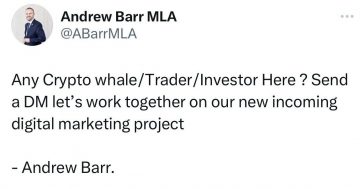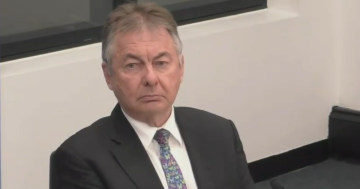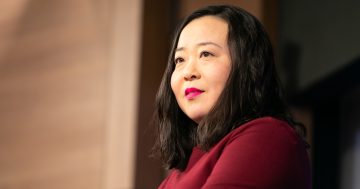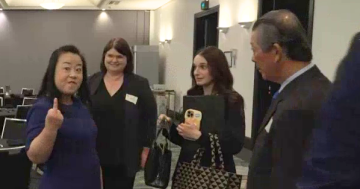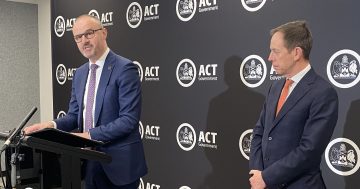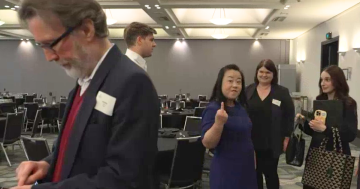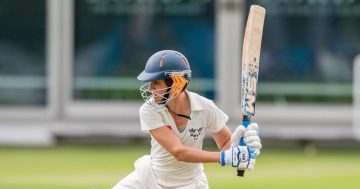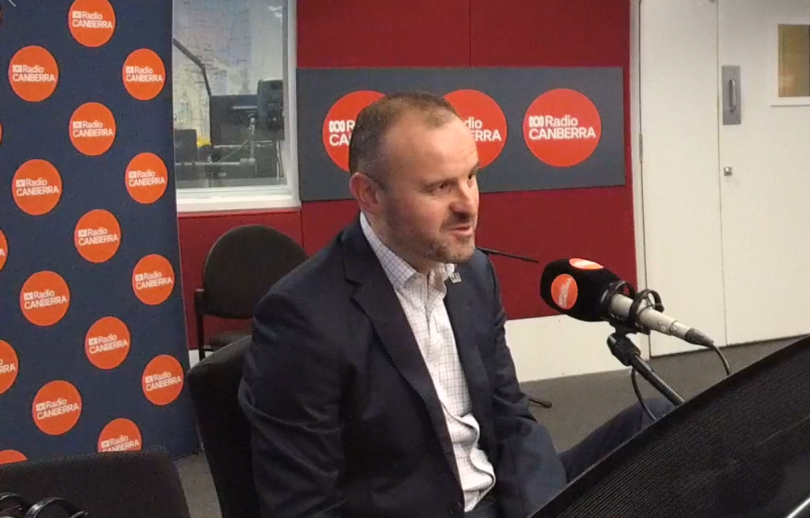
Chief Minister Andrew Barr expresses his regret to ABC morning radio. Photo: Still taken from ABC Canberra video.
It wasn’t quite a mea culpa but Chief Minister Andrew Barr did his best to mend fences with the Canberra media when he told the ABC that he regretted his comments to communications professionals about hating journalists and being over the mainstream media.
“It wasn’t a very nice thing to say, I shouldn’t have said it and I regret it,” he told ABC radio. “It caused a lot of upset for journalists and people who feel it was an inappropriate thing to say, which it was.”
But, and it was a pretty big but, the Chief Minister did not resile from his comments about the ‘newspaper’ in this town which had taken an openly hostile stance to his Government.
“I think there are some media outlets that follow a particular political view to the point that their editorial policies are not independent or balanced. And I don’t think you can put on your masthead that you are independent if your stated editorial policy is to support the election of a conservative government,” he said.
Mr Barr acknowledged that the comments sprang from a degree of frustration with the editorial policies of a number of media outlets in this city.
He said that the media, in general, did not serve the Australian people well, singling out The Australian and the Murdoch press but said he was hardly the first politician to make that observation.
Mr Barr denied disrespecting the more senior elements of the Canberra community who got their news from traditional media.
“I didn’t, I never have. That’s another part of this whole debate that is just extraordinary. Because I might also want to talk to the other 330,000 Canberrans doesn’t mean I don’t want talk to and engage with that group,” he said.
“My point consistently has been what about those other people who don’t listen to AM radio, who don’t read the newspaper.”
The Chief Minister said the Government could talk to both, saying what he was asking communications professionals was to help the Government talk to those not engaged by traditional media, although he acknowledged he had not done it in a particularly effective way.
“We will communicate with the people of Canberra through traditional media, through new media, independent outlets that operate in this city, the throw-away weeklies that are given away for free; through websites, social media, through street stalls, doorknocking, telephone calls, every day every member of the Government is out talking to hundreds if not thousands of people and we’ll use every possible method of communications,” Mr Barr said.
“We won the last ACT election because we had 250,000 conversations directly with voters. People are smart, people often ask questions that are more relevant to them than journalists ever can to politicians. That’s the great thing about Canberra, its one of the most engaged communities and people often will be subject matter experts more so than some journalist will ever be.”
He said the aim was not to cut journalists out of the process, saying politicians had always endeavoured to talk directly to voters.
“No, it never has been. And reporting to that effect is misleading and unfair,” he said.
“No I shouldn’t have made that statement. I apologise for making that statement. It wasn’t a nice thing to say but it doesn’t detract from my point that we need to communicate with all Canberrans and I can’t just rely on the traditional media to reach all Canberrans.”
Mr Barr said he couldn’t change the news model, which was hooked on controversy and ignored much of what his Government was doing.
When asked what lessons he had learnt from the experience, a bruised Mr Barr said that there was no such things as off the record or Chatham House rules.
“I didn’t know that there would be someone secretly recording. I will now expect that everywhere I go in the context of being asked to give some frank remarks or commentary on anything that it will always be recorded,” he said.
“I won’t be the first or last politician to learn that lesson. Yes, it was a classic gotcha moment and the media love gotcha moments.”
Mr Barr portrayed himself as free of media influence and said he wanted a clear separation between his Government and the media.
“What is very clear from this is that there is no newspaper editor, no broadcast editor, no journalist who can pick up the phone and demand that I change my position on anything. There is no Alan Jones-style operator in the ACT where the premier or the chief minister gets hauled in and told you will change that policy or we will campaign against you,” he said.
“Media plays its role of scrutinising government but it doesn’t have a seat at the cabinet table, it’s not elected, no one will tell me what to do.”
Seeking to put an end to the matter, Mr Barr said these were the last public comments he would make on the media.
“I’ve said my piece. Let’s move on from here,” he said.












